
Rediscover Radiance with Organic Castor Oil
Share
Rediscover Radiance with Organic Castor Oil: Exceptional Remedy
One powerful player in natural health remedies is organic castor oil. Derived from the seeds of the castor oil plant (Ricinus communis), this substance has been recognised for centuries for its multitude of health and beauty benefits.
Organic castor oil, a form that's free from artificial additives and harmful pesticides, has been highly sought after due to its purity and potent properties. Made from the castor oil plant's cold-pressed seeds, the castor oil retains its natural nutrients, making it the superior choice for those aiming to harness its therapeutic potential.
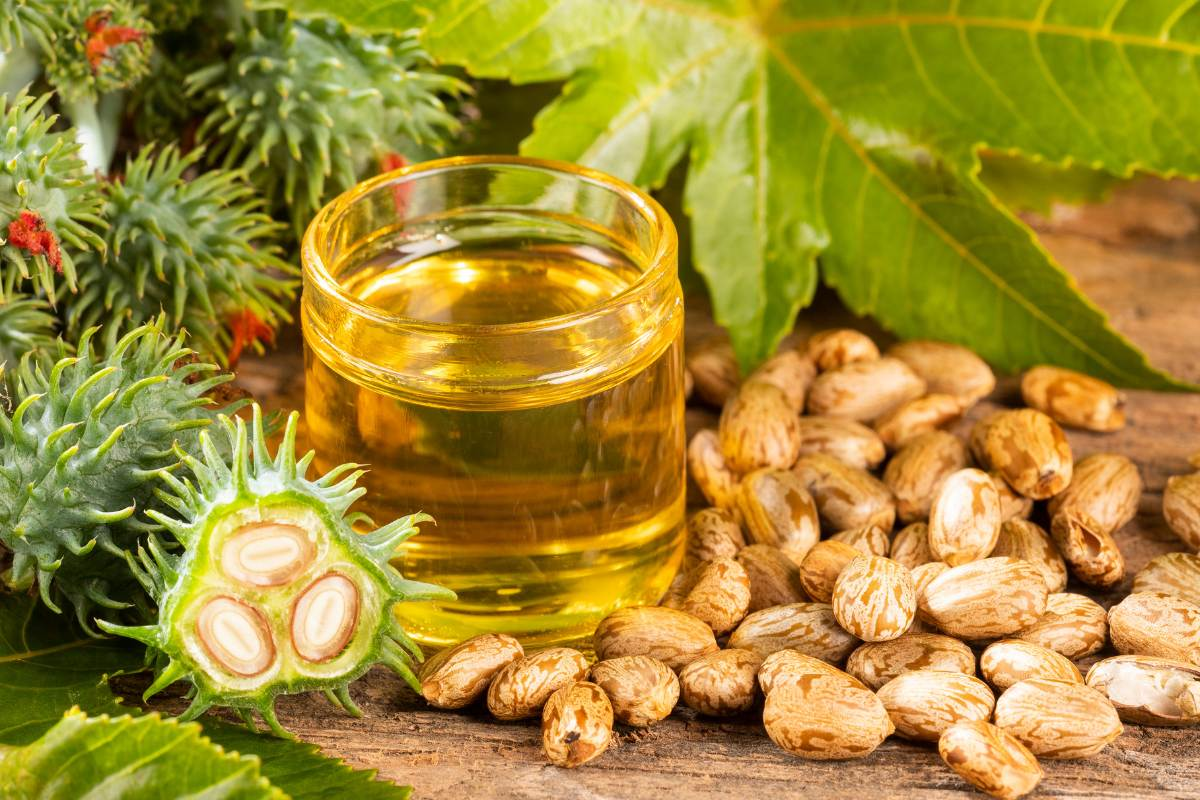
The Castor Oil Plant: A Source of Healing
The castor oil plant, native to the Mediterranean region and parts of Africa, has been recognised for its fast growth and high oil yield. Its seeds, encased in a strikingly mottled shell, are rich in a unique blend of beneficial compounds, making the benefits of the castor bean or castor oil capsules remarkably broad-ranged.
The Immense Benefits of Castor Oil
From its exceptional anti-inflammatory and antibacterial properties to its skin-enhancing capabilities and industrial applications, the benefits of castor oil have left an indelible mark on various sectors. Whether you're seeking a natural remedy, a beauty hack, or an eco-friendly industrial substitute, organic castor oil could be the answer you're looking for.
This article will explore the fascinating history, extraction process, unique composition, and versatile uses of organic castor oil. You will also learn about the potential side effects of castor oil overdose and the precautions necessary for its safe usage. Buckle up and join us on this journey into the world of castor oil!
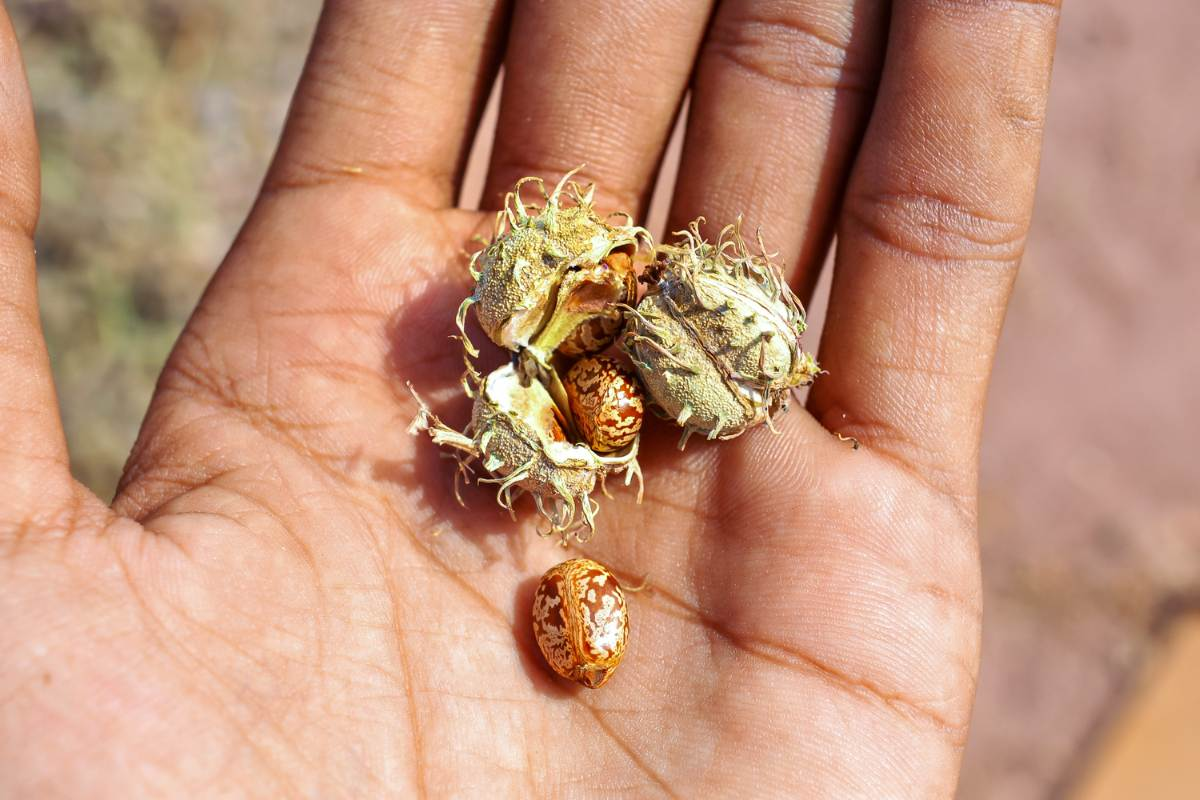
The Origin and History of Castor Oil
The remarkable journey of castor oil, particularly organic castor oil, is steeped in a rich history. It is more than just a substance for health and beauty treatments; it's a legacy passed down through generations, proving its worth and versatility over the centuries.
Early Recognition of Castor Oil's Potential
Castor oil's use can be traced back to ancient civilisations. It's interesting to see how its value was recognised early on and how this recognition transcended cultural and geographical boundaries.
Castor Oil in Ancient Egypt
The earliest recorded use of castor oil dates back to around 4000 BC in Egypt. Castor oil was an essential part of their daily life and traditions. Archaeological findings reveal that Egyptians used castor oil regularly as fuel for their lamps. However, their usage of this natural elixir wasn't just limited to illumination. Ancient Egyptians also used it for medicinal purposes and included it in ointments for treating various ailments.
Additionally, castor oil was deemed valuable enough to be included in the tombs of pharaohs, a testament to its significant role in ancient Egyptian civilisation.
Castor Oil in Ayurveda and Chinese Medicine
Moving to the east, the ancient medicinal systems of Ayurveda in India and traditional Chinese medicine also recognised the healing properties of the castor plant and its coconut oil. Documented in their ancient scriptures, castor oil was celebrated for its anti-inflammatory, antibacterial, and laxative properties. It played an integral role in various treatments, further attesting to its global appeal in the ancient world.
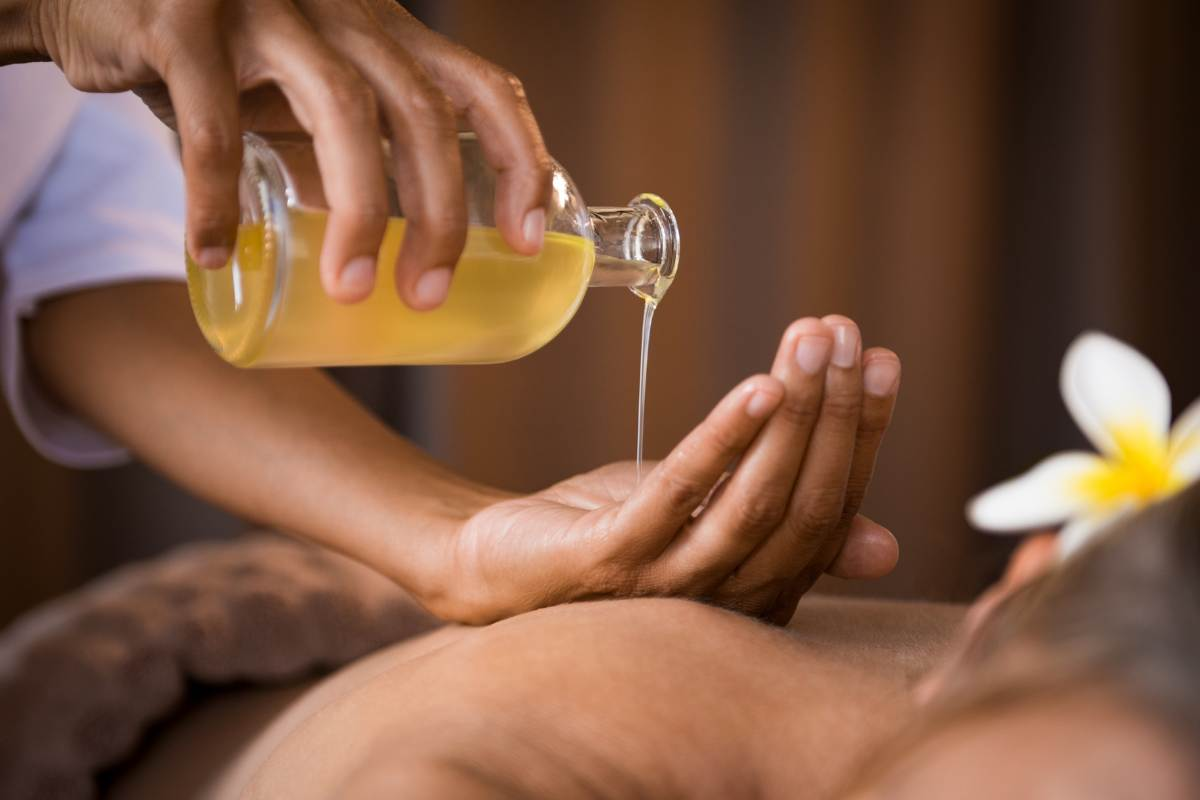
Castor Oil in Modern Times
Fast forward to modern times, and castor oil remains a valuable resource. The rise in demand for natural products has thrown organic castor oil into the spotlight. Today, its benefits are recognised and appreciated worldwide, not just in the health and beauty sector but also in the industrial and manufacturing arenas.
Whether you look at its early beginnings in ancient Egypt or its valuable place in Ayurvedic medicine and Chinese medicine, the castor oil story is truly captivating. As we continue to learn more about this remarkable oil, it's clear that its journey through history is as rich and varied as the benefits it offers.
A Natural Remedy for the 21st Century
In the ever-evolving world of health and beauty, organic castor oil has carved out a niche. From natural health enthusiasts to large-scale manufacturers, the appeal of castor oil is truly universal.
Castor Oil in Natural Health and Wellness
With the resurgence of interest in natural health remedies, organic castor oil has experienced a significant rise in popularity. Today, it is a common staple in many households worldwide, valued for its versatility and potent health benefits.
Whether used as a massage oil to ease muscle pain, a natural laxative to aid digestion, a hair tonic for lush and shiny tresses, or a skin moisturiser for soft and supple skin, the applications of castor oil are remarkably broad. It is also becoming increasingly popular as a carrier oil in aromatherapy.
Additionally, research into the benefits of castor oil continues to uncover new uses and potentials. Studies suggest that vegetable castor oil use has potential benefits in areas such as boosting the immune system, reducing symptoms of arthritis, and even aiding in wound healing.
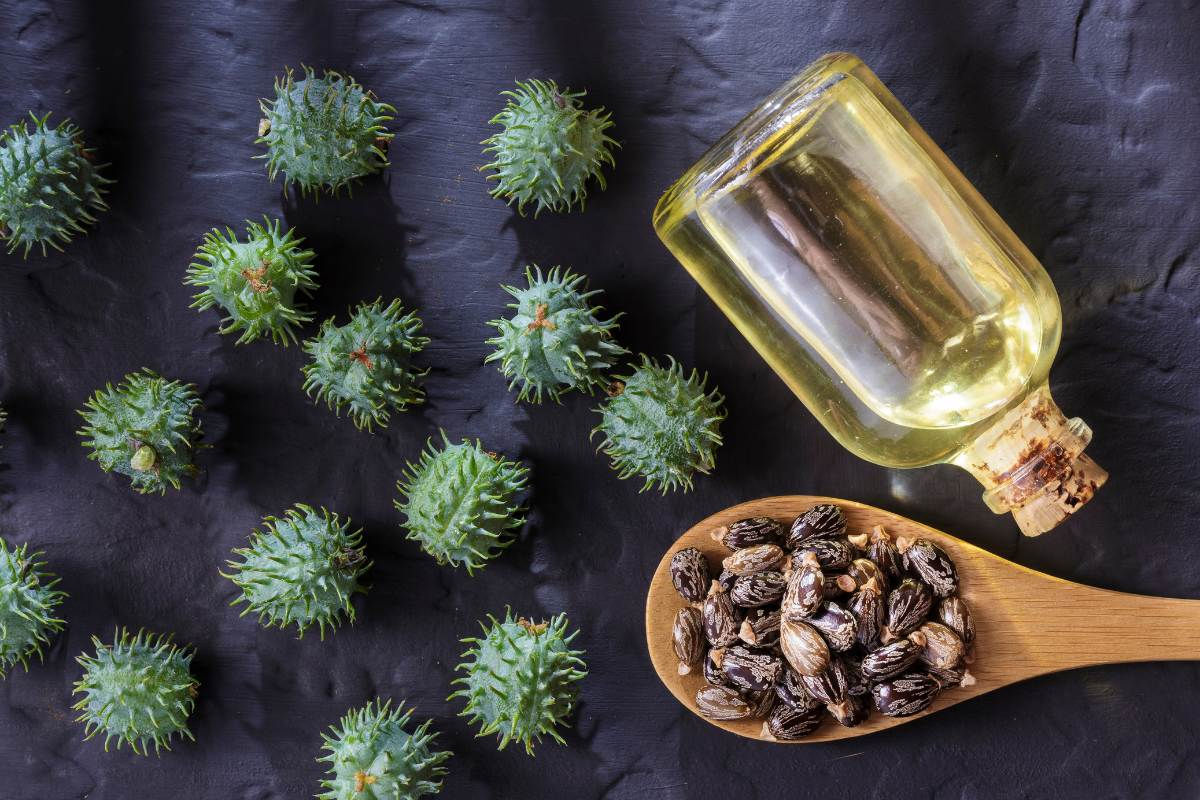
The Industrial Applications of Castor Oil
Beyond health and wellness, castor oil extends into various industrial applications. Its high viscosity and stability make it an excellent lubricant in various industries, including the automotive sector.
In the manufacturing sector, castor oil is used to produce biodiesel. It also creates polymers for plastics, adhesives, and paint. Moreover, it is used as a conditioning agent for fibres in the textile industry.
Using a plant-derived, biodegradable substance like castor oil is highly beneficial in a world increasingly conscious of sustainability and eco-friendliness. It serves the purpose effectively and reduces environmental impact, marking a significant step towards a sustainable future.
The continued relevance of castor oil in modern times, from personal health and beauty to industrial applications, underscores its incredible versatility and lasting value. This age-old remedy has successfully adapted to the needs of the 21st century, solidifying its place in our lives.

Extraction and Processing of Castor Oil
To fully appreciate the benefits and applications of castor oil, it's essential to understand its journey from seed to bottle. The extraction and processing of castor oil are carried out with meticulous care, ensuring it benefits and retains its beneficial properties.
The Raw Material: Castor Oil Plant
The source of castor oil, the castor oil plant or Ricinus communis, is a perennial plant native to the Mediterranean region, Eastern Africa, and India. Known for its large glossy leaves and prickly seed pods, the castor bean plant is as visually striking as beneficial.
Growing Conditions and Harvesting
The castor oil plant is a robust species, able to grow in various environments, although it thrives best in well-drained soil under sunny conditions. The plant's seeds, which contain the oil, are harvested in the late summer or early fall when the seed pods have dried and split open.
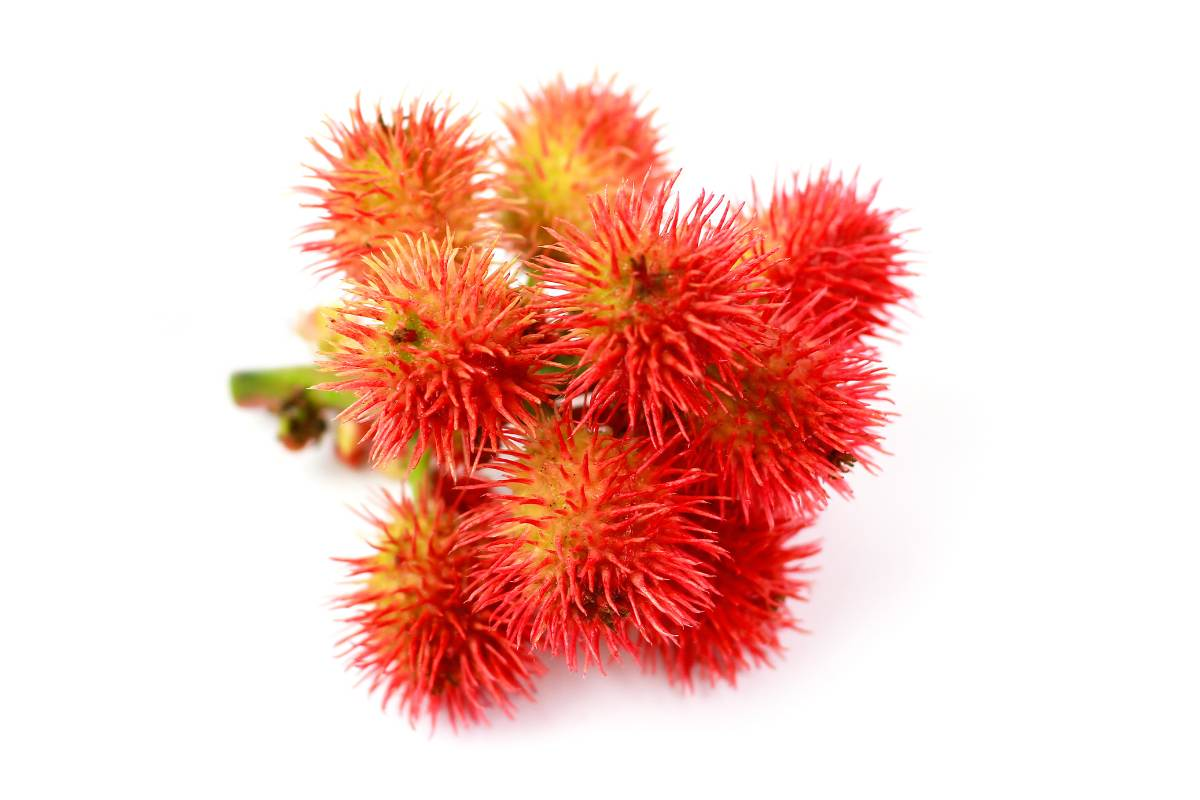
Extracting the Oil: Cold-Pressing vs Solvent Extraction
Once the seeds are harvested, they undergo several processes to extract the oil. The two primary methods used for extraction are cold-pressing and solvent extraction.
Cold-Pressing: Preserving Nutrients
Cold-pressing is the method of choice for producing high-quality, organic castor oil. The process involves pressing the seeds under high pressure, causing the oil to seep out. This method does not involve heat or chemicals, ensuring the ingesting castor oil retains all its natural nutrients and beneficial properties. Cold-pressed castor oil is superior due to its purity and higher nutritional content.
Solvent Extraction: Maximising Yield
Solvent extraction, on the other hand, involves using a chemical solvent to extract the castor oil benefits from the seeds. This method yields too much castor oil than cold-pressing but can also remove or alter some of the castor oil supplement's beneficial properties. As such, solvent-extracted castor oil is typically used for industrial applications rather than therapeutic uses.
From the fields where the castor oil plant grows to the processes that extract the oil from its seeds, it's clear that producing pure castor oil is a journey of care and precision. This careful extraction and processing make castor oil the potent and versatile substance we value today.
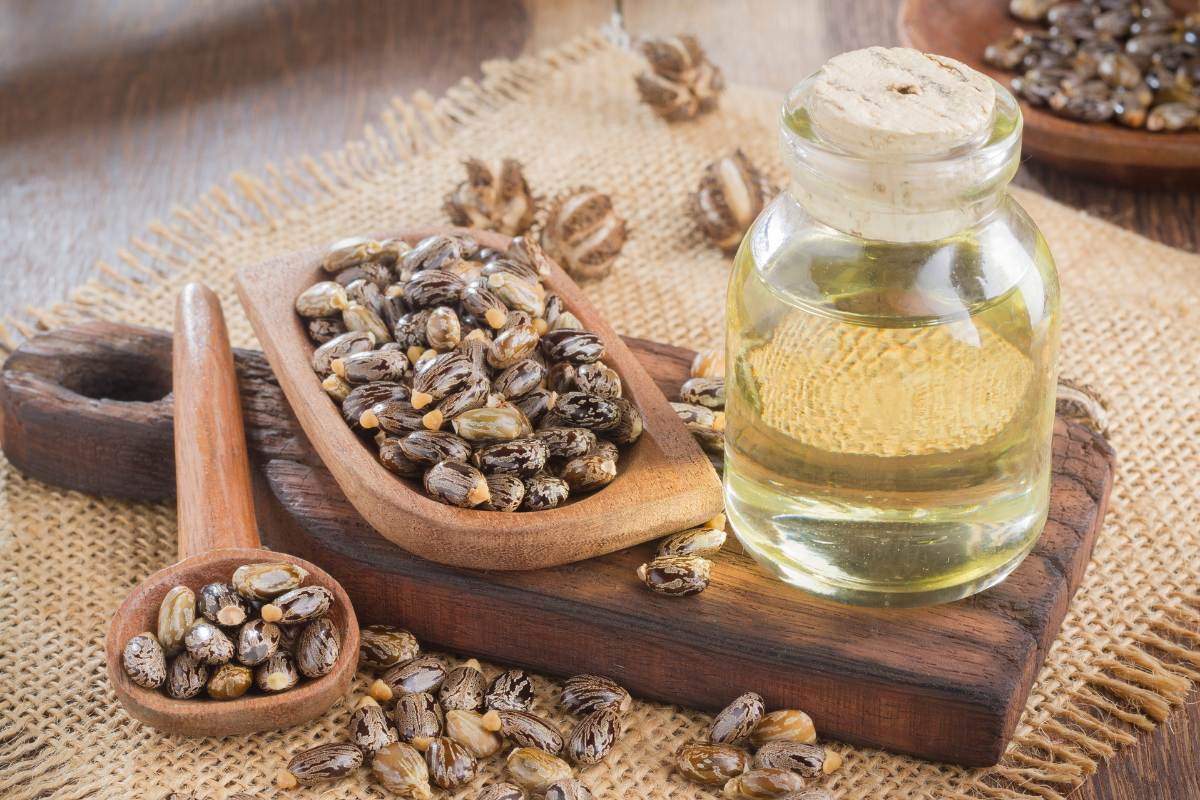
The Castor Oil Plant: Nature's Gift
The Ricinus communis, or the castor oil plant, the source of this beneficial castor oil used in, is a treasure trove in itself. This plant has blessed us with its labour castor oil-rich seeds and adorned our landscapes with decorative appeal.
Description and Characteristics of the Castor Oil Plant
The castor and olive oil can plant is an eye-catching species native to the Mediterranean, East Africa, and India. It is a perennial plant that has gained recognition for its distinctive, almost other-worldly appearance.
Leaves and Stems
The castor oil plant stands out with its large, glossy foliage. The palmate leaves can grow up to 40 cm long, with 5-12 deep lobes radiating from a central point. The leaf colour ranges from dark green to reddish-purple, depending on the variety. The plant's stems are often red-tinted, adding to its striking appearance.
Flowers and Fruits
The plant bears male and female flowers on the same plant, with the male flowers at the lower part of the inflorescence and the female flowers on top. Following the flowering stage, the plant develops spiky seed pods that are as distinctive as beneficial.
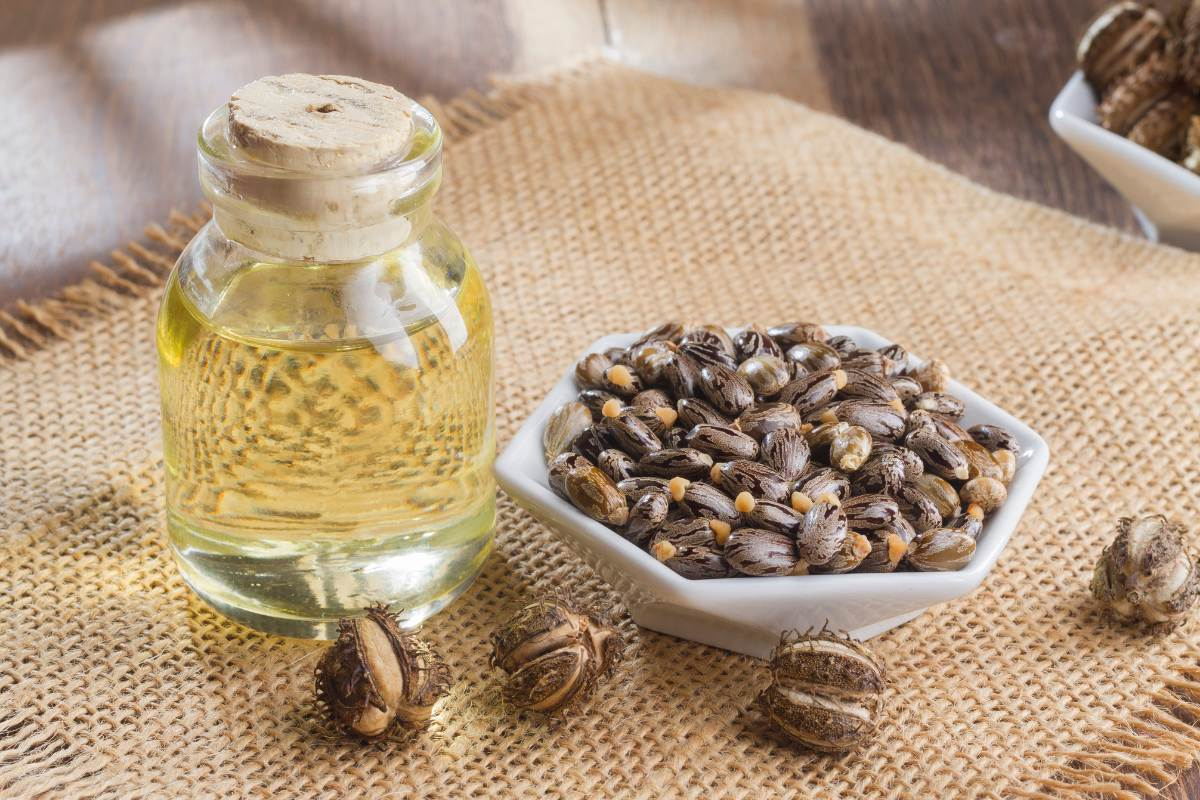
The Castor Oil Plant's Seeds: The Source of Castor Oil
The most valuable part of the castor oil plant is its seeds, renowned for their high oil content.
Seed Characteristics
Each castor oil plant seed is encased in a hard shell patterned with intricate mottling. The kernel contains about 40-60% castor oil that acts up inside this tough exterior. The seeds are also known for their toxic content - ricin, a potent poison if ingested or inhaled.
Harvesting and Processing the Seeds
The seeds are typically harvested manually when the capsules turn brown, indicating they're ripe. After harvesting, they are dried and decorticated (removing the seed's outer layer) before extraction.
The castor beans or oil plant is indeed a marvel of nature. Its striking appearance and oil-rich seeds make it an important species both aesthetically and economically globally. Its seeds' oil content has made significant contributions to health, beauty, and various industries, truly validating the castor bean plant's significance in our lives.

The Complete List of the Benefits of Castor Oil
Renowned for its medicinal and therapeutic benefits, castor oil is a remarkable natural product. The benefits of this versatile oil are incredibly diverse, ranging from health and beauty applications to uses in various industries.
Health Benefits of Castor Oil
Several health benefits are associated with castor oil, thanks to its unique composition rich in ricinoleic acid, fatty acids, and other beneficial compounds.
Digestive Aid
Castor oil has been traditionally used as a natural laxative. Consumed orally, it stimulates the intestines, aiding in the relief of constipation.
Anti-Inflammatory Properties
The ricinoleic acid in castor oil possesses significant anti-inflammatory properties. It can be applied topically to dry skin to reduce inflammation and relieve pain and discomfort.
Boosts Immune System
Preliminary studies suggest castor oil may enhance the production of lymphocytes, the body's disease-fighting cells, potentially boosting the immune system.
Skin and Wound Healing
Castor oil is often used as a topical treatment for wounds and skin ailments due to its antimicrobial and moisturising properties.

Beauty Benefits of Castor Oil
The beauty industry greatly appreciates castor oil's ability to enhance natural beauty from head to toe.
Hair Growth and Health
Castor oil is widely used in hair care routines for its potential to promote hair growth, moisturise the scalp, and enhance hair's natural shine.
Skin Care
Due to its hydrating properties, castor oil can help moisturise the skin, potentially reducing signs of ageing, like wrinkles and fine lines from oily skin.
Natural Eyelash and Eyebrow Enhancer
Regular application of castor oil on eyelashes and eyebrows can lead to thicker and fuller growth, thanks to essential fatty acids that nourish hair follicles.

Industrial Benefits of Castor Oil
The benefits of using castor oil can also extend to various industries, serving many practical uses.
Lubricants in Various Industries
Its high viscosity and stability make castor oil an excellent lubricant in industries such as automotive and aviation.
Biofuel Production
Castor oil has also found usage in biofuel production, marking a significant step towards sustainable and renewable energy sources.
From promoting overall skin health and enhancing beauty to serving as an industrial workhorse, the benefits of taking castor oil alone are incredibly wide-ranging, justifying its widespread use and high regard worldwide. It is truly a testament to the remarkable powers of this natural substance.

Castor Oil Packs: A Traditional Healing Practice
Castor oil packs have been a trusted natural remedy for centuries. Originally recommended by the psychic healer Edgar Cayce, these various coconut-approved castor oil packs are utilised for their potent healing and detoxifying properties.
What Are Castor Oil Packs?
A castor oil pack involves the application of organically sourced, cold-pressed castor oil to the skin, which is then covered with a layer of plastic wrap and followed by a hot water bottle or heating pad. The applied castor oil pack is typically left on the body for about an hour.
Preparing a Castor Oil Pack
To make a castor oil pack, you'll need a piece of unbleached and untreated cotton or wool flannel, organic castor oil, a wrap or plastic bag to cover the flannel and apply castor oil, and a heat source. Soak the flannel in castor oil, place it on the affected area, cover it with the wrap or bag, and apply heat.

Benefits of Castor Oil Packs
These packs of arthritis castor oil are potent for healing and detoxifying the body. Their benefits are primarily due to the high concentration of ricinoleic acid in castor oil, which possesses powerful anti-inflammatory and analgesic properties.
Pain Relief
By providing heat and applying pressure, castor oil packs can alleviate pain, making them beneficial for arthritis pain, menstrual cramps, and muscle pains.
Anti-Inflammatory
Castor oil packs can reduce inflammation when applied to inflamed areas, relieving irritated skin from skin rash, cysts, boils, or swollen joints.
Detoxification
There's a belief that topical castor oil packs may enhance the body's detoxification processes. They are often applied over the liver or other digestive organs to support detoxification and improve digestion.
Boosts Circulation
The heat from castor oil packs can enhance blood circulation, promoting removing toxins and delivering nutrients to the cells.
Castor oil packs offer an easy and non-invasive way to reap the benefits of castor oil. While they are a traditional remedy, and many people swear by their benefits, it's important to note that more scientific research is needed to confirm these effects. As always, it's advisable to consult with a healthcare provider before beginning any new health regimen.

How to Use Castor Oil for Hair and Skin
Castor oil for skin and hair is becoming increasingly popular thanks to its rich nutrient profile and numerous benefits. Here's how you can incorporate this versatile oil into your beauty routine.
Using Castor Oil for Hair
Rich in ricinoleic acid and other nourishing ingredients, castor oil can work wonders for your hair.
Hair Growth
One of the most common uses of castor oil for hair is promoting growth. Apply the oil to your scalp, massage it, and leave it on for several hours or overnight before washing it out. The castor oil stimulates blood circulation to the hair follicles, promoting growth.
Scalp Health
Castor oil's antibacterial and antifungal properties can help maintain a healthy scalp. Apply the oil to your scalp and massage it to help combat dandruff and scalp infections.
Hair Conditioning
The oil is also an excellent conditioner. It can be applied to the hair shaft to lock in moisture, reduce frizz, and increase shine.

Using Castor Oil for Skin
Castor oil's hydrating and healing properties can benefit your skin in many ways.
Moisturiser
Castor oil makes a great natural moisturiser. Apply a small amount to your skin after cleansing for a hydration boost.
Acne Treatment
The anti-inflammatory and antimicrobial properties of castor oil can benefit acne-prone skin. Apply a small amount of labour castor oil to clean dry skin, focusing on areas with acne.
Anti-Aging
Castor oil can be used to reduce the signs of ageing. Apply the oil to areas with fine lines or wrinkles for its moisturising and smoothing effect.
Healing Wounds
Applying castor oil to minor cuts and abrasions can help speed the healing process due to its antimicrobial and anti-inflammatory properties.
Castor oil may be the answer whether you're seeking a natural solution for hair loss or growth, a remedy for acne, or a potent moisturiser. However, as with all skincare products, patch tests the oil on a small skin area first to ensure no adverse reaction.

The Side Effects and Precautions of Castor Oil Usage
While castor oil is generally safe for most people, it's crucial to understand that it may have side effects and precautions associated with its use. Awareness of these potential risks can help you use the castor oil supplement more safely and effectively.
Potential Side Effects of Castor Oil
Like any natural remedy, castor oil can cause adverse effects in some people, especially when used improperly or in excess.
Skin Irritation
Topical application of castor oil can sometimes lead to skin irritation or allergic reactions in some individuals. Signs may include rash, itching, or redness.
Digestive Disturbances
When ingested, castor oil can cause digestive issues such as diarrhoea, abdominal cramps, or nausea, particularly if consumed in large amounts.
Precautions to Take When Using Castor Oil
There are certain precautions to remember when using castor oil to minimise risks.
Patch Test
Before using castor oil on your skin, perform a patch test on a small area to see if any adverse reactions occur.
Pregnancy and Breastfeeding
Pregnant and breastfeeding women should avoid using castor oil without consulting a healthcare provider due to potential risks.
Internal Use
The internal use of castor oil should only be done under the guidance of a healthcare provider. Improper dosage making castor oil can lead to severe digestive issues.
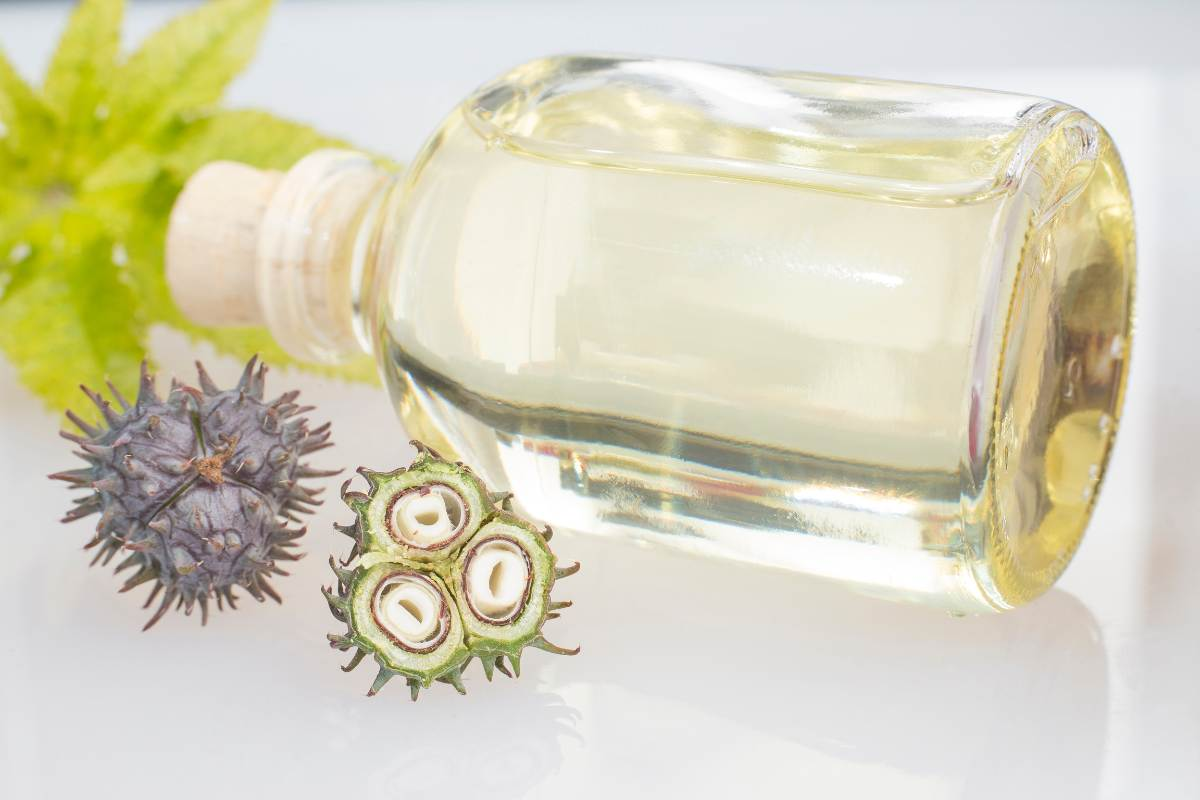
Conclusion: The Powerful Benefits of Castor Oil
Despite potential side effects, castor oil's powerful health, beauty, and industrial benefits make it a noteworthy product. From its historical usage to modern times, this natural remedy derived from the castor oil plant has repeatedly proven its value. By understanding and respecting its properties, using it responsibly, and consulting with a healthcare professional when necessary, we can safely harness the benefits of castor oil.
Shop some of our castor oil products available for nationwide delivery:
Boost Wellness with ESCENTIA's Black Castor Oil, Refined Hexane Free, Tree of Life Pure Organic Castor Oil, Flora Force Castor Oil Hexane Free, and Nautica Organics Cold Pressed Castor Oil.
Frequently Asked Questions
-
What is castor oil made from? Castor oil is extracted from the seeds of the Ricinus communis plant, commonly known as the castor oil plant.
-
Can castor oil promote hair growth? Yes, castor oil is widely used to promote hair growth. Its high ricinoleic acid content stimulates blood circulation to the hair follicles.
-
Is castor oil safe for the skin? Generally, castor oil is safe for skin application. However, a patch test is recommended to check for allergic reactions before use.
-
Can castor oil be ingested? While castor oil has been traditionally used as a laxative, its internal use should be done under the guidance of a healthcare provider due to potential side effects.
-
What are the side effects of using castor oil? Potential side effects of castor oil include skin irritation, and digestive disturbances like diarrhoea and abdominal cramps, especially when used in excess or ingested.
